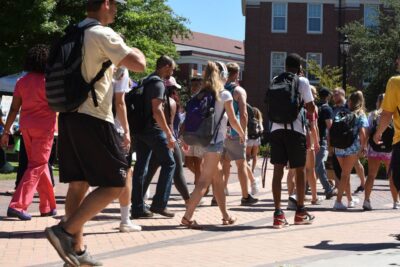Assessing student success coaching at Kansas Wesleyan University
Joseph Koons
Assistant Vice President for Student Engagement and Success, Kansas Wesleyan University
The views and opinions expressed are those of the author and do not necessarily represent the views or opinions of EAB.
After examining cohort retention rates, Kansas Wesleyan University launched a Student Success Coaching program as part of our first-year experience program in 2020. In its third full year, the program continues to evolve and adapt to student needs. First-time freshmen are assigned to a student success coach who serves as an academic advisor, mentor, life coach, tutor, cheerleader, and advocate throughout their pivotal year at KWU. Some of the topics addressed by success coaches include study systems, identity and inclusion, motivation and achievement, and support networks. Success coaches follow a timeline to proactively engage students in these topics, while customizing coaching sessions based upon student needs.
The goal of this project is to assess student learning through the program. As a success coach, I know, anecdotally, that students are improving. However, we were not collecting evidence of student learning through the program. Sense of belonging is a foundational element of this program and is an area of research interest for me. Creating and improving study systems has long been a part of my professional roles at various institutions. So, it made sense to examine both student sense of belonging and study systems as part of student learning or growth.
-
Interested in the Rising Higher Education Leaders Fellowship?
KWU uses Navigate 360 to manage student success at the university, including appointment management, early alerts, and case management across units. This project relied on the appointment feedback feature to solicit student feedback and monitor student learning over the course of the semester. Students receive a text prompt to complete the feedback an hour after each appointment. The survey asks them to rate their agreement with five statements on a Likert scale. The topics include confidence in major selection, academic performance, sense of belonging, financial confidence, and holistic health/resilience. Students meet with their success coach at least once a month, so the expectation is track student progress in these areas over the course of the semester.
Early results show that sense of belonging is high among students, but satisfaction with academic performance is mid to low. One possible reason for the latter could be time spent studying over the course of the semester. Individual follow-up revealed that many students were devoting less than five hours per week to studying.
Based upon these early results, we are making the following changes to the success coaching program. First, we are creating a success coaching syllabus. The syllabus will formalize the expectations of both the success coach and student throughout the first year. The second recommendation is to further incorporate the success coaching program into our first-year experience course. As we continue to collect student feedback, we will be able to make strategic decisions for continuous improvement.
More Blogs

A winning platform for higher education in a high-scrutiny era

Five trends that give community colleges a surprising edge in 2026
